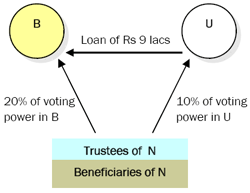|
|||||||||||||
| Deemed Dividend | |||||||||||||
|
|||||||||||||
|
the ground that N was a trust holding the shares in the name of the Trustees for the benefit of the beneficiaries. Aggrieved by the order of the CIT(A) the Income Tax Authorities (the Revenue) preferred an appeal to the ITAT. The assessee & the Revenue relied on two directly conflicting decisions of the ITAT, Mumbai viz., Seamist Properties (P) Ltd. v/s ITO [95 TTJ 201(Mum)] relied on by the assessee; and DCIT v/s Nikko Technologies (I) Pvt Ltd. [ITA No.4707/Mum/2002] relied on by the Revenue. M/s Weaveland, Panipat, Haryana were granted permission to appear as intervener before the Special Bench. M/s Weaveland, a partnership firm had various transactions of receipts and payments of money with M/s Paliwal Industries Pvt Ltd (PIPL). The partners of M/s Weaveland were the shareholders of PIPL. The AO taxed the net outstanding by Weaveland to PIPL in the hands of Weaveland as deemed dividend u/s 2(22)(e). The CIT(A) reversed the order of the AO and the revenue was in appeal against it. Issues before the ITAT: The following questions of law were raised before the Special Bench : Whether deemed dividend under section 2(22)(e) can be assessed in the hands of a person other than a shareholder of the lender company? Whether the expression “such shareholder” occurring in section 2(22)(e) refers to a shareholder who is both a registered shareholder as well as a beneficial shareholder or only to a registered shareholder? Observations of the Special Bench: The Special Bench observed that as per section 2(6A) (e) of the Income Tax Act, 1922 (provision corresponding to section 2(22)(e) of the Income Tax Act, 1961), two categories of payments were considered as dividend viz;
These were taxable as deemed dividend even as per the Income‐tax Act of 1961. However in the 1961 Act, there is an additional condition that payment should be to a shareholder who is a beneficial owner of shares and also who has a substantial interest in the company (i.e.; his shareholding in the company is not less than 20% of the total voting power of the company). Subsequently an amendment has been made in 1987 w.e.f. 1st April, 1988 whereby a new category of payment was considered as deemed dividend. It is payment to any concern in which such shareholder is a member or a partner and in which it has substantial interest. The Special Bench relied on the Supreme Court judgement in the case of CIT v/s C.P. Sarathy Mudaliar [83 ITR 170(SC)] wherein the Company advanced loans to an HUF who was the beneficial owner of shares in that company but the shares were registered in the name of the Karta who held shares for and on behalf of the HUF. It was held that since the HUF was only a beneficial owner of the shares & not the registered shareholder of the company (as recognized by Company Law), no addition in the hands of the HUF could be made in respect of deemed dividend. Conditions laid down by the Special Bench to be fulfilled in determining the applicability of Section 2(22)(e): The Special Bench has laid down the following conditions to be fulfilled in determining whether a particular advance can be considered as deemed dividend u/s 2(22)(e):
In the case of the assessee, the payment was made to a concern referred above but the registered shareholder (the trustees of N) and the beneficial owner of the shares (the beneficiaries of N) were different persons & hence the loan was not taxed as deemed dividend in the hands of B. Conclusion: Deemed dividend can be taxed only in the hands of a person who is a registered shareholder of the lending company and no other person. Thus, even if the trustees and the beneficiaries of the Trust were one and the same person(s), yet the loan given to the other company would not be taxed as deemed dividend income in the hands of the said company. The expression ‘such shareholder’ referred to in section
2(22)(e) refers to both a registered shareholder as well
as a beneficial shareholder. If the person to whom loan
is given is a registered shareholder but not the beneficial
shareholder, then the provisions of section 2(22)(e) will
not apply. Similarly, if a person is a beneficial
shareholder but not the registered shareholder, then
too, the provisions of Section 2(22)(e) will not apply. In
short the shareholder mentioned in this sub‐section Thus, going forward, in the event that a closely held
company inadvertently gives a loan/advance to a group
concern in which the immediate shareholder of the
lending company holds a substantial interest not directly
but indirectly, the Special Bench decision may come in
handy as a defense. However, we do not recommend
this as a planning device. It may only be used as a |
|||||||||||||
|


